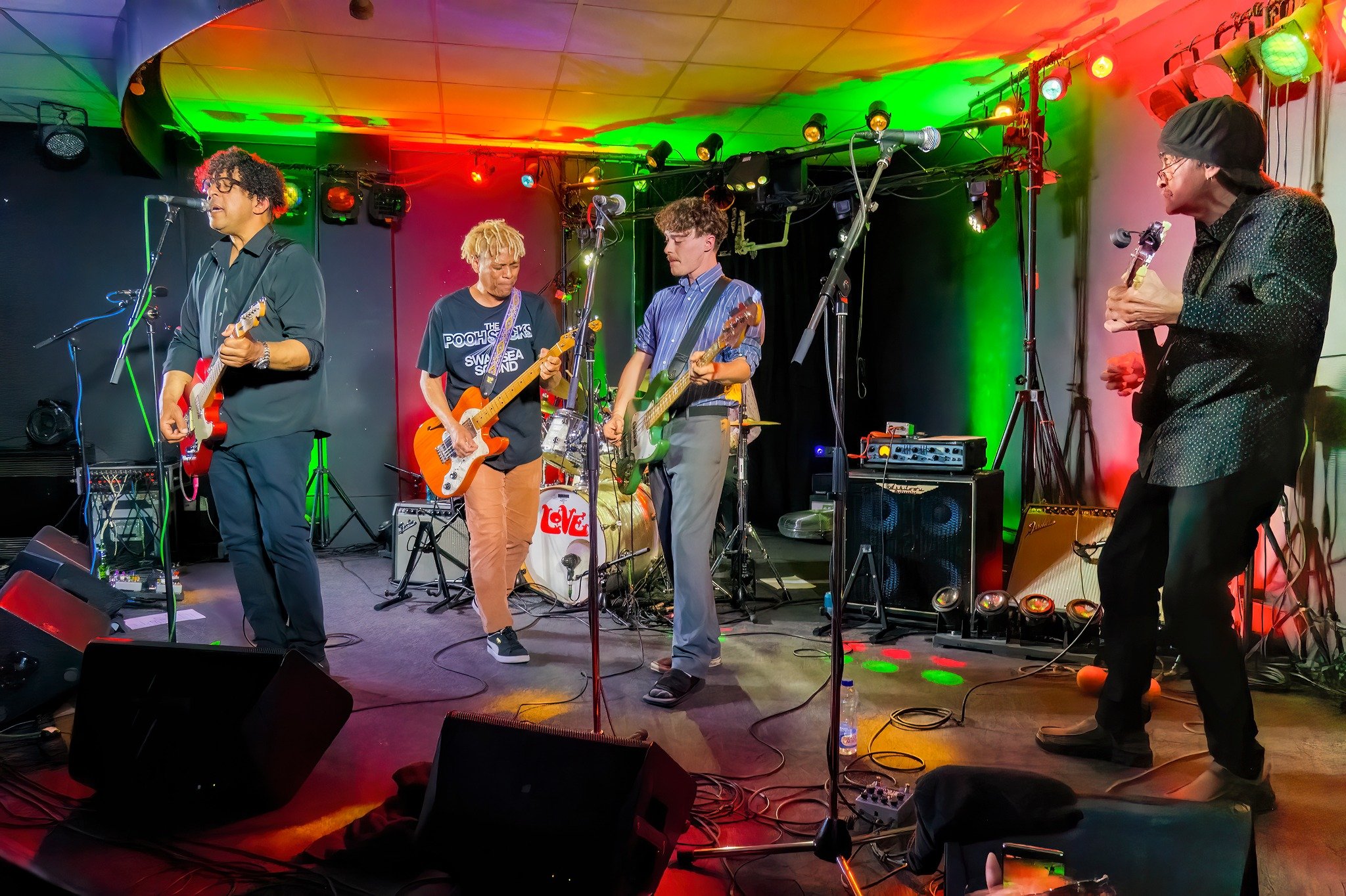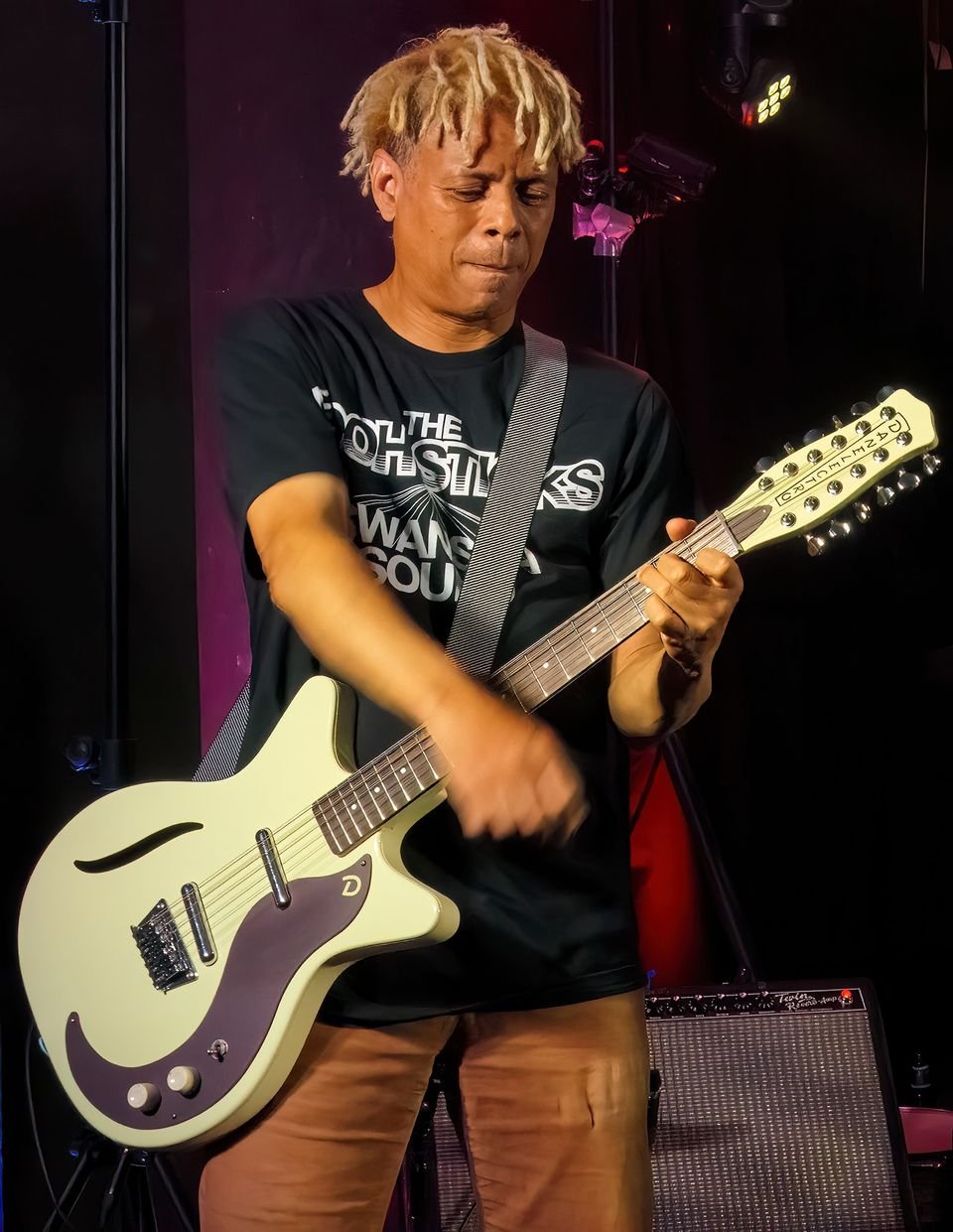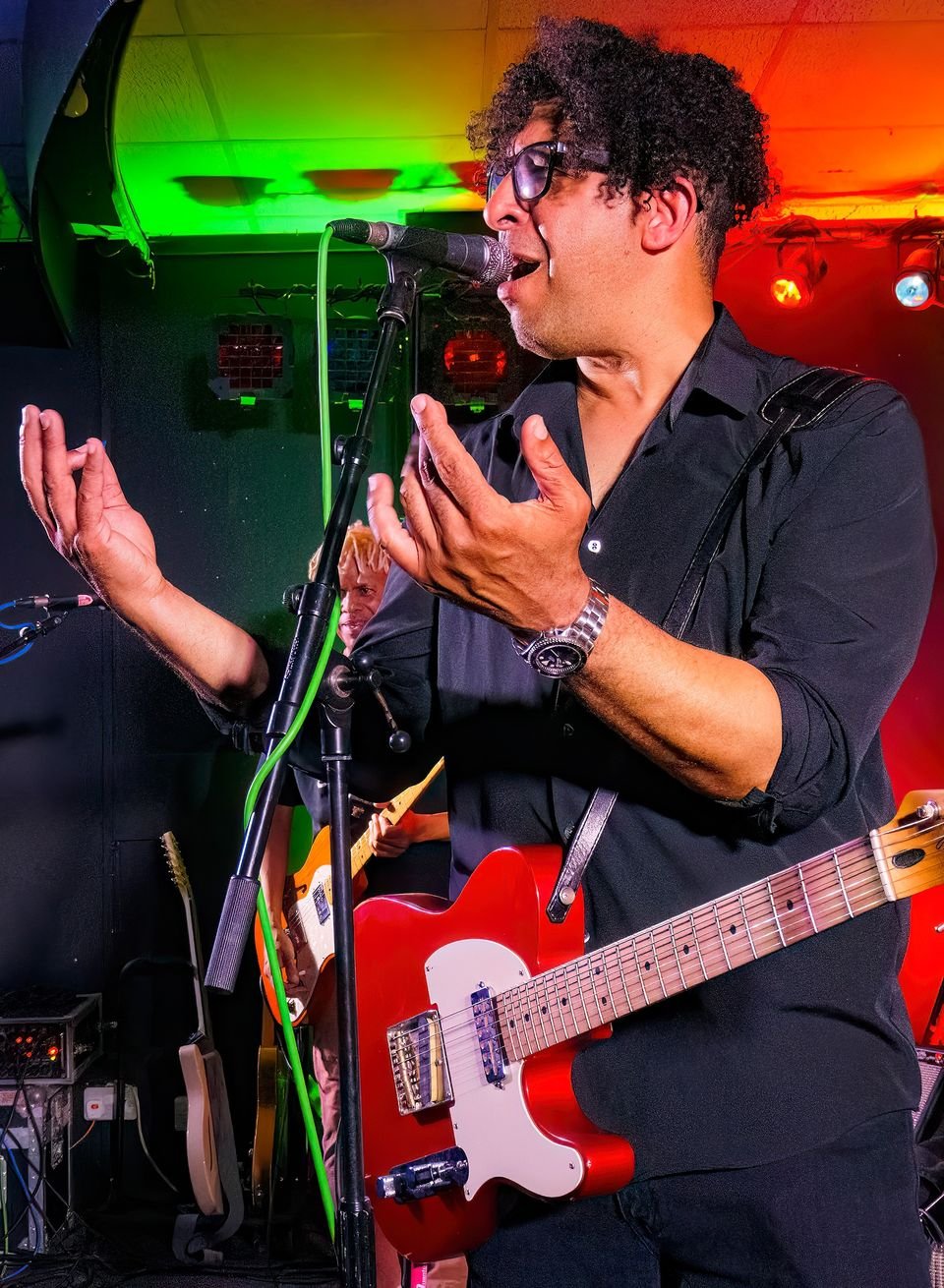In an exclusive for KCL, Will Gregory interviewed the singer of Cardiff's Anonymous Iconoclasts about their third album, 'Send In The Suits'. They chatted about songwriting, post-lockdown creativity, encouragement for the live music scene and some of the twenty tracks (20!!) on the brand new album. As the band are 'anonymous', Steve's face is not available but his opinions are!
'Send In The Suits' is released on July 30th, 2023 and is distributed through Distrokid.
Physical CD's are available from the band's website: https://www.anonymousiconoclasts.com/merchandise
LOVE - The Earl Haig Club - 12/7/2023
Legend Johnny Keeps Arthur’s LOVE Alive
All Images Barry Morris
Forever Changes by LOVE is a piece of work that escorts you, from the callow to the creaky, through the twists and turns of your life.
Its haunting and poignant yet exuberant tracks cry of youth, death, optimism, negativity, paranoia, naivety, happiness, sadness, fear, loathing and loving. It is both unsettling and reassuring; it is surprisingly in the moment and yet prompts a wistful longing for a lost age.
Arthur Lee’s Los Angeles-based psychedelic band recorded Forever Changes as their third- and clearly best- effort of four top class albums in the mid-sixties. This was no breakthrough album; they had already torn up the Strip and won the laurels of Laurel Canyon. Love and Da Capo had sold six figures or more each. They had houses and cars and a rock star way of life. The band- Arthur Lee on guitar and vocals for all but two of the tracks; Johnny Echols on lead guitar; Bryan Maclean on guitar and the other vocals; drummer Michael Stuart and bassist Ken Forssi- were drifting and disjointed and nearly not good enough to play on the tracks Arthur had written. In fact, it seems co-producer Bruce Botnik had session musicians ready to go and he did put down a few tracks with them (He also had Neil Young ready to work with him but that’s another story).
Arthur, in turn, was beset by his own demons, convinced he was likely to join many contemporary talents of that time and die very young. Working in one of rock’s rare diverse bands, in a predominately white industry, and against a background of the Vietnam War, his experiences and his inner fears did not allow him to wholeheartedly follow the beckoning bourgeoise flower power movement that was already fuelling nearby San Francisco’s hedonistic counterculture. He refused to tour and the band lost vital opportunities to tighten up the sound and spread the word of their talent.
These internalised pushings and pullings vied with Arthur’s never-doubted musical strength and inner belief in the music and his determination to transfer it into sounds to share. It all fired up Forever Changes- and riding shotgun with him was his childhood friend, guitar man Johnny Echols. Well, what else do you become when you’re from Memphis Tennessee and your middle name is Marshall?
Behind the crisp and clipped vocals, Forever Changes is an album of exquisite supplementary sounds that combine, overlap and standout throughout the eleven tracks. Harpischord, Tijuana brass, lush strings, multiple rhythm changes, flexible bass patterns- it is an incredibly bold, mature and complex sound for a group of musicians that were barely out of their teens.
And perhaps the most significant contributor was Johnny Echols’ chopping, coaxing, piercing, howling crystal-clear guitar work, a sound that helped to spawn many successors in the school halls and back bedrooms of the world as the new rock generation unfurled their wings.
Arthur avoided the curse of the 27 Club and in fact it wasn’t until 2006, aged 61, that his prophetic fears of death eventually came true. But LOVE live on, and, led by Johnny Echols, they came to the UK and they came to Cardiff’s Earl Haig Club to put a spring in the arthritic step of their original fans while inducting younger ones into rock’s hall of fame.
Were they any good? You bet.
Any fears were dispersed after a few bars of “A House Is Not A Motel”, Arthur’s anti-war opus “By the time that I’m through singing /the bells from the school of war will be ringing/more confusions/ blood transfusions” with a fab burst of Johnny’s timeless guitar setting the mood and the pace for the night.
The three guitar line-up (This LOVE is administered by Johnny’s tour band, Baby Lemonade , who had played with Arthur Lee and are a fine collection of psychedelia-ridden lads- Rusty Squeezebox, Mike Randle, drummer David Green and Dave Chapple on bass) chimed and riffed and chugged and boogied and managed to replicate the distinctive vocals and also power their way past the classic fills that had been previously designated to strings and brass.
Live and Let Live ; the brilliant The Daily Planet- and then Johnny came alive on the classic The Red Telephone, reaching back into the mists of time to replicate and reaffirm his set-in-stone belief in freedom from the very depths of his heart.
The wonderful AndMoreAgain and Brian Macleans’ magical AloneAgainOr were heart rending moments that both recaptured the immediacy of teenage angst and yearning but also depicted for us older fans a closed-off time of innocence and uncertainty, of lost yet loved years.
Yes, there were other great tracks from the other three albums (Four Sail followed Forever Changes) including You Set the Scene, Neil’s Song, Singing Cowboy (and they’ll be a few older fans with painful sides after overdoing the Yoo Hoo-backed arm stretches) and Revelation.
But Forever Changes remains the pinnacle of LOVE’s creativity.
So good, I bought two tee-shirts.
Praise for Love’s ‘Forever Changes’ LP:
‘The Second Greatest Psychedelic Album of all Time’
‘One of the Best and Most Highly Regarded and Influential Rock Albums of All Time’
‘One of the Finest and Most Haunting Albums to come out of the Summer of Love’
‘The Best Record Ever’ – The Stone Roses.
Five stars out of five -AllMusic
Five stars out of five- The Encyclopedia of Popular Music
Five stars out of five -Rolling Stone Album Guide
Ten out of ten-NME
All Images by Kind Permission Barry Morris
What’s LOVE got to do with it? Well, just about Everything!
How would you like to hear one of the very best albums of all time- don’t rely on me, rely on Rolling Stone, NME, The Great Rock Discography and many others- played live in an intimate setting in Cardiff?
Well you can on Wednesday July 12th, when Johnny Echols’ LOVE, led by the co-founder, guitarist and songwriter, will perform a set of classic psychodelia tracks from the seminal San Francisco band’s flower-power soaked catalogue.
Johnny Echols set up the band in the mid-sixties with his childhood friend Arthur Lee and their first three albums Love, Da Capo and, of course, the aforementioned legendary LP Forever Changes, fired them into the counterculture superstructure.
Joining Johnny Echols on the Earl Haig stage will be Baby Lemonade, who from 1993 until Arthur’s death in 2006 had become an essential part of the renaissance of LOVE’s music.
Forever Changes may not have created a revolution in society but it did in youth culture, merging new rock and guitar conventions with intricate horn and string arrangements and embracing bandleader Arthur Lee’s ahead of his time (Geddit?) skewed scepticism of the flower power movement of the time.
So get to the Earl Haig Club on July 12 and enjoy THE gig of Cardiff’s summer of LOVE. And make sure you wear a flower in your hair- that is, if you’re lucky enough to still have some….
Praise for Love’s ‘Forever Changes’ LP
‘The Second Greatest Psychedelic Album of all Time’
‘One of the Best and Most Highly Regarded and Influential Rock Albums of All Time’
‘One of the Finest and Most Haunting Albums to come out of the Summer of Love’
‘The Best Record Ever’ – The Stone Roses.
Five stars out of five -AllMusic
Five stars out of five- The Encyclopedia of Popular Music
Five stars out of five -Rolling Stone Album Guide
Ten out of ten-NME
Classic Album Review - The Libertines
After a tumultuous time in the recording studio; The Libertines were able to create an album as equally as chaotic as the band's off-stage antics.
At the turn of the 21st Century, indie dominated the UK charts. Bands such as The Strokes and the Vines paved the way for a new wave of garage rock musicians. However, The Libertines also contributed to this sudden revival of the scene. The strained relationship between front-men Pete Doherty and Carl Barat and Doherty's aloof personality and unpredictable behaviour mixed with their punk-infused debut album caused the band to be at the fore-front of the UK scene.
Despite this, a second album seemed unlikely with Doherty's health rapidly deteriorating due to a number of well-documented addictions. All of Doherty's problems culminated in 2003 when he was arrested and jailed for 6 months after burgling bandmate Barat's flat and damaging a number of items.
Surprisingly, the pair were able to set aside their differences and head into the studio; determined to recapture the magic of their debut record. To be able to harness the same feeling as 'Up the Bracket', former Clash guitarist Mick Jones returned to produce the album with former Suede guitarist Bernard Butler also lending a hand with the production.
Jones' influence can be heard prominently on the opening track 'Can't Stand Me Now' with Barat and Doherty playing call and response guitar riffs that are reminiscent of the trademark Clash sound. The song itself delves into the strained friendship between the two charismatic front-men and how recent events affected them but eventually brought them back together.
The band continue their punk-infused assault on the ears with second track 'Last Post on the Bugle'. The rumbling guitar riff weaving a wall of sound and complimenting Doherty's lackadaisical vocal delivery perfectly.
Songs such as 'Music When the Lights Go Out' and 'What Katie Did' display a new side to the Libertines that had never been heard before on previous recordings. Both tracks are covered in a pop sheen with the group possibly desiring more radio airplay to catapult them into indie rock stardom.
However, the group still maintain their unadulterated punk sound throughout the majority of the album. 'The Ha Ha Wall' is a highlight of the record with an iconic swirling guitar riff chugging through the entirety of the run-time. 'The Ha Ha Wall' could potentially be seen as a tribute to Doherty's profession due to his lyricism making remarks about how music saved his life and prevented boredom in his youth.
The Libertines continue their raw, garage rock sound on tracks such as 'Arbeit Macht Frei', a chaotic and manic minute and a half of pure punk mayhem. Doherty's lyrics are uncharacteristically political, showcasing the ridiculousness of homophobia and racism.
The percussion section can sometimes be overlooked due to the erratic personalities of the two front-men but Gary Powell and John Hassell shine throughout. Powell is able to showcase his unbelievable timing on tracks such as 'Don't Be Shy' and 'Narcissist' where he is able to overcome the chaos and keep the songs on track.
Finally, 'What Became of the Likely Lads' is a perfect way to end the record, Doherty and Barat once again singing about their peculiar dynamic whilst also playing complex guitar riffs that are joyfully unconventional.
Overall, The Libertines eponymous album is a seminal record in the UK indie scene and is a must listen for anyone wanting to understand this intriguing sub-culture that captivated Britain in the early 2000s.
Rating: 8/10
Peter Hook and The Light - Tramshed - 22/4/23
Image subject to copyright laws TCPhotography©
As Salford legend Peter Hook left the stage of Cardiff’s Tramshed following an explosive encore culminating in Love Will Tear Us Apart, there was a feeling of pure shared bliss between the sold out crowd. It’s hard to articulate it. Misty-eyed fans of all ages seemed frozen in the moment, trying to process what they had just seen and heard. For all of Joy Division’s reputation as being a gloomy band, the response to Hook’s rendition of the 70s post-punk legends’ 2 albums was nothing short of jubilant.
Peter Hook, best known as the bassist for Joy Division and subsequently New Order, is almost always on the road keeping the works of the two enormously influential bands alive. While New Order themselves continue without him, their overpriced shows are lacking in what Hooky consistently brings to the table - genuine heart, and passion for the music and the bands’ legacies. Currently touring Joy Division: A Celebration, the bulk of the gig is dedicated to complete playthroughs of the band’s two seminal albums - Unknown Pleasures, and Closer. An opening set of New Order material and encores of other Joy Division classics is just the icing on the cake, as the albums are worth the price of admission alone.
Peter Hook, along with long-time band The Light, faithfully capture the unique Joy Division sound with an uncanny raw power. Every single track sounds magnificently faithful and yet far more impactful, with Hooky’s powerful vocals proving perfectly suited for the late Ian Curtis’ songs. With his trademark low-hanging bass, Hooky plays flawlessly. It becomes clear throughout the night that the bass was ever so instrumental (if you’ll pardon the pun) to the two bands’ unique sounds, and to be in the presence of this master is surreal. The Light are all impeccable musicians, too, and aid in these stunning renditions of Joy Division and New Order’s celebrated works.
There isn’t a bad word one can say about a Peter Hook gig. The infectious heart and soul that goes into the performances quickly spill into the crowd, resulting in a loving and celebratory energy throughout - while some of the songs may be dark and distressing, the response to each is always joyous. I would even go so far as to say that you can do no better than a Hooky gig; everything about them is perfect and unlike anything else you’ll find on the live music scene.
Peter Hook cements the iconic reputation and legacy of Joy Division and New Order, and also himself, with his live performances - and there’s still time to catch him on his current tour. Be prepared to beg, barter, or steal, though, as it’s looking pretty sold out across the board…There’s always his October tour!
Upcoming dates and more info: https://peterhookandthelight.live/
Classic Album Review - All Mod Cons - The Jam
The Jam's third studio album is much more subdued when compared to their previous releases but still manages to keep their punk ideologies intact.
In 1978, frontman Paul Weller hit a wall. Notably suffering from writer's block and also struggling with the commercial failure of their previous record, 'This is the Modern World'.
Weller openly admitted to becoming complacent with the song-writing process, causing the album to be re-recorded in its entirety due to the first set of songs reportedly being substandard.
After being put under pressure from record label 'Polydor' to release a hit record, the British trio took this challenge in their stride and created an album that maintained the aggression of their previous outings combined with new-found pop sensibilities that were more widely accessible.
These re-recordings as tedious as they were seemed to pay off. 'All Mods Cons' instantly became a hit and has since been regarded as one of punk's greatest albums.
Despite the altering in their sound, Weller's working class views and left-leaning politics remained prominent throughout his lyrics. Songs like 'Mr Clean' showcase his distaste for the hierarchy and the lavish lifestyles that they lead. Weller's raw and pugnacious delivery confronts the senses, proving that he believes every word that he is saying on this track.
'To Be Someone (Didn't We Have a Nice Time)' continues the theme of the hierarchy. This time Weller criticises society and how fickle they can be in attaching themselves to someone that gains even a small amount of fame; which could possibly be taken from personal experience.
Bruce Foxton remains an integral part of The Jam's sound, with his blistering basslines bringing each track to life as each story unfolds. This can be seen most predominantly in 'Down in the Tube Station at Midnight' where his driving bassline compliments Weller's erratic vocal delivery perfectly. Weller originally discarded 'Tube Station' due to being unhappy with the songs arrangement before Vic Coppersmith was eventually able to convince him otherwise.
Weller shows his versatility throughout the record however; moving away from politically-fuelled punk tracks and showing his vulnerable side on the beautifully simplistic 'English Rose'. The track itself is a lot more stripped back when compared to most of their songs with Weller initially being hesitant to include it on the record due to its romantic nature.
Songs like 'In the Crowd' and 'Fly' show the band experimenting with their sound, taking inspiration from a number of hard rock acts. Both tracks start quietly before exploding into catchy rock classics that overwhelm the senses and are bound to take the listener off guard. 'In the Crowd' also makes a reference to 'Away from the Numbers' from their debut album.
Finally, Weller does go back to his punk sensibilities in snippets throughout the record. 'A Bomb on Wardour Street' and 'Billy Hunt' both share likenesses to songs that would have featured on their previous two efforts. The band notably disliked 'Billy Hunt', opting to replace it with 'The Butterfly Collector' on the US release.
Overall, 'All Mod Cons' is an important record that helped shape British counter-culture and the mod revival scene in the late 70s and early 80s. The album also has glimpses of the transitional period that the band would undertake in the coming years, transforming from angry punks to one of British rocks true giants.
Rating: 8/10
Classic Album Review - After The Gold Rush - Neil Young
One of music's most versatile and prolific songwriters sets his electric guitar to one side and releases a poignant and thought-provoking album that is a staple in his vast discography.
Neil Young has portrayed a number of personas during his career; differing from the insightful poet to the gritty hard rocker. The Canadian-born singer is able to combine these traits into one compelling record that varies from vulnerable melancholy to moral and political disdain.
After the release of his abrasive and visceral second album 'Everybody Knows This Is Nowhere', Young transitions away from this sound and creates and intimate album that relies heavily on the minimalistic sounds of his acoustic guitar and piano.
The simplicity and the subtlety of the record instantly shines through with the opening track 'Tell Me Why'. Young's fragile vocal delivery paired with his complex guitar playing is a notable shift away from his previous work whilst still being able to keep his philosophical lyricism intact.
The title track showcases Young's ability to take real-life trauma and transform them into haunting ballads that are audibly striking and perfectly paint a picture in your head. The song itself is supposedly about a catastrophic flood that swept through California, but Young has since stated that he is unable to recall the true meaning of the song.
Despite the album moving in a more acoustic direction, Young's aggressive guitar riffs still shine through in brief moments throughout the record. The politically charged 'Southern Man' is a particular highlight of the album with Young's raspy vocals perfectly emphasising the importance of the message he is trying to get across. The song was extremely controversial at the time, Young expressing his hatred for the American Deep South and the racism that was prominent throughout much of the 20th century.
There are also moments on the record that hark back to his self-titled debut. The exquisitely dramatic 'Don't Let it Bring You Down' and the infectiously catchy 'When You Dance I Can Really Love' are perfect examples of folk-infused rock tracks with Young putting his own spin on the genre to make them utterly unique.
The album is also able to encapsulate complicated emotions such as melancholy and sorrow without being cringeworthy. The single 'Only Love Can Break Your Heart' is a perfect example of this, with Young dedicating it to band-mate Graham Nash who had recently split up with fellow folk singer Joni Mitchell.
'After the Gold Rush' also includes a cover of the classic Don Gibson track 'Oh, Lonesome Me'. Young was unphased by the popularity of the song and transformed it into a soft yet intimate ballad. The song is full of vulnerability, Young's trembling vocals perfectly complimenting the themes of loneliness and isolation.
Finally, the minimalistic nature of the record causes a couple of the tracks to lack any real substance. 'Cripple Creek Ferry' and 'Till the Morning Comes' are songs that come from the same formula as the rest of the album but are ultimately filler that fall short of the mark when compared to the other songs.
Overall, 'After the Gold Rush' is a quintessential Neil Young album that is a perfect blend of his hard rock sensibilities and his love of traditional folk music. However, it is not a particularly accessible record due to Young opting for a more subdued album when compared to his previous work up to that point.
Rating: 8.1/10
Razorlight - Great Hall - 7/4/2023
The support act were Afflecks Palace a four-piece band from Manchester. They played an entertaining set showcasing their debut album "Only Light in this Tunnel is the Oncoming Train" Set highlights were "Dancing is not a Crime" and "Shut up". They have been dubbed in the press as Nu-Manchester. They were joined on stage by members of the Indie band Pastel whose song "Soho" proved popular with the crowd.
I had not seen Razorlight since 2005 when they supported Oasis, From the outset of Razorlight as a band they have been known for their high-energy live shows. Lead singer Johnny Borrell is a charismatic frontman with a commanding stage performance. They instantly captured the crowd’s attention with a mixture of swagger and enthusiasm. They started the set with "Rip it Up". The set highlights were "Stumble and Fall", "In the Morning", "Wire to Wire" and the classic "Golden Touch". The high-energy set finished with the slower "America".
The set only lasted 80 minutes but the band complimented each other with their high musicianship, infectious hooks and rhythms.














